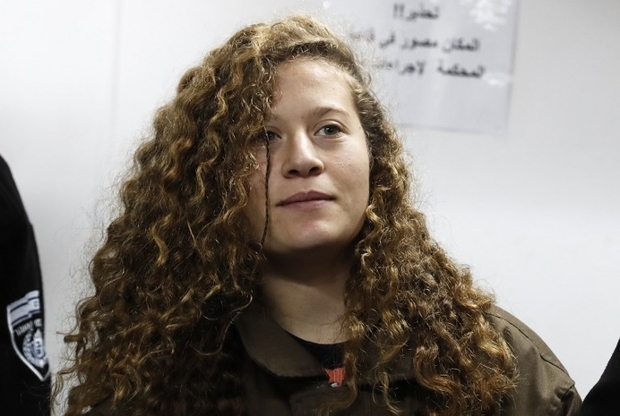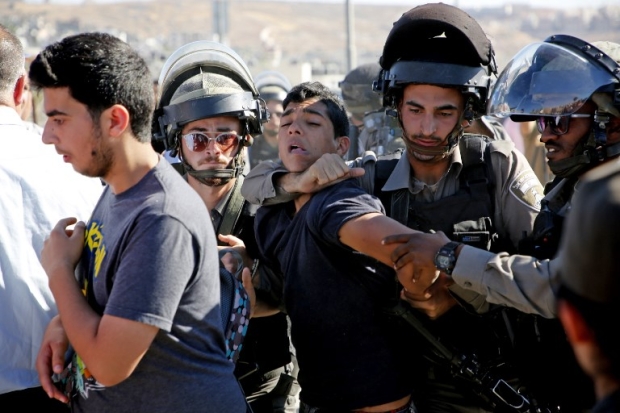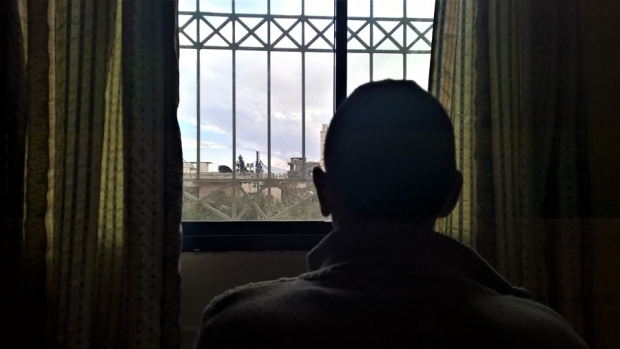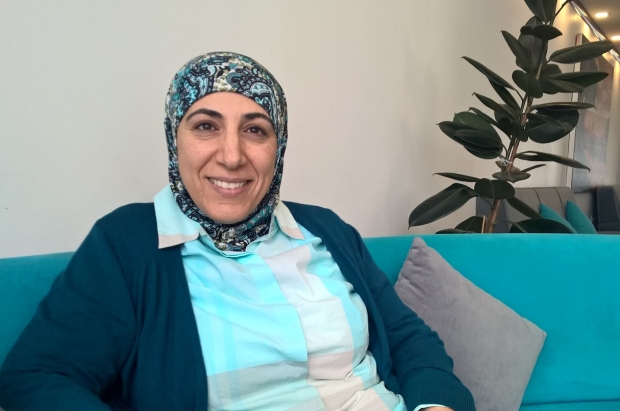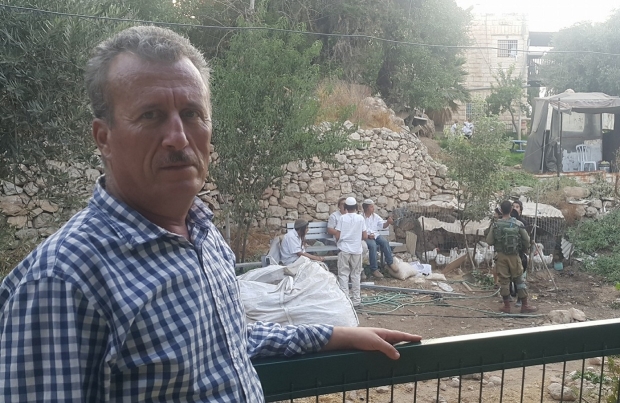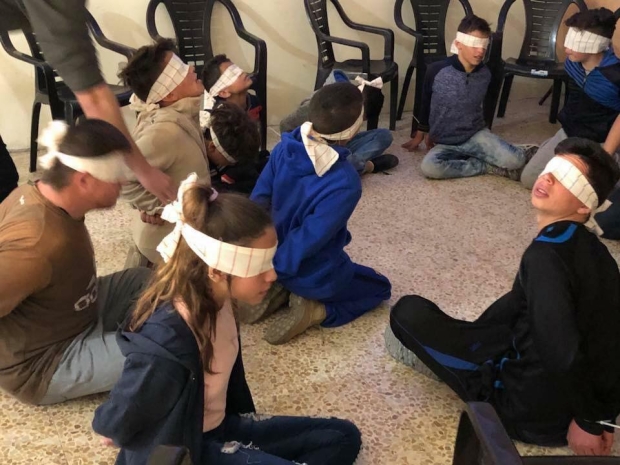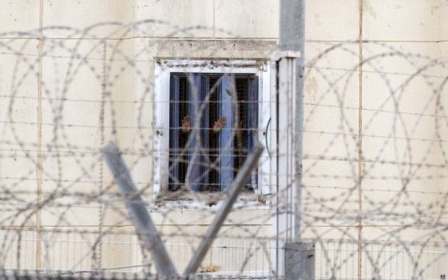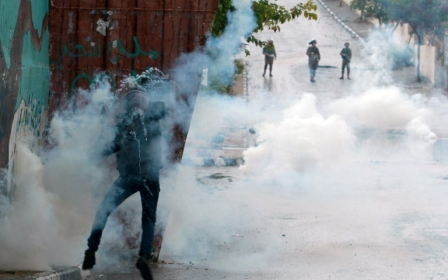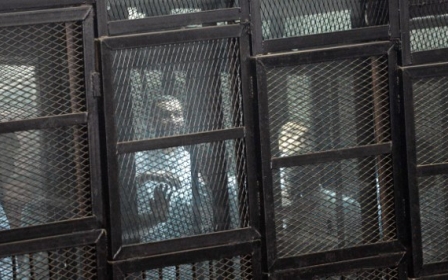Stolen childhood: Life after prison for Palestinian minors
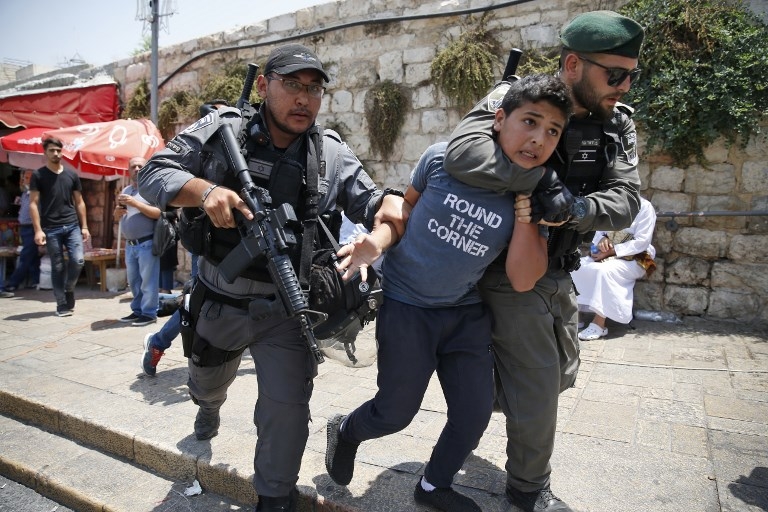
OCCUPIED WEST BANK - Sometimes, 18-year old Mohammad dreams that he is back in Ofer military prison.
“I remember my friends in prison. I feel that I am in there again,” the young Palestinian said softly, looking down as he recalled the eight months he spent imprisoned by Israel between 2016 and 2017.
She lost her childhood because of something we - the world, adults - are responsible for
- Bassem Tamimi, Palestinian political activist
Mohammad, who preferred not to mention his last name for safety reasons, was detained when he was only 16 years old.
According to Palestinian prisoners’ rights group Addameer, 330 Palestinian minors were imprisoned by Israel in January.
“Yes, I feel proud. Yes, she is strong,” said political activist and Ahed's father, Bassem Tamimi. “But she grew up before her age. She lost her childhood because of something we - the world, adults - are responsible for.”
Physical violence
According to Carol Zoughbi-Janineh, administrative supervisor of the East Jerusalem YMCA rehabilitation programme for former child prisoners, the number of Palestinian children detained by Israeli forces has steadily increased since the year 2000.
“When we started the programme [in 2008], we had between 500 and 700 children detained yearly. Last year we had 1,467 children detained,” she told MEE. “It is very alarming.”
While the overwhelming majority of imprisoned minors are boys, Zoughbi-Janineh said girls have increasingly been detained in the past three years, with more than 60 girls detained in 2017, a sharp rise from one or two each year prior to 2015.
Several rights organisations have denounced the incarceration conditions for Palestinian children over the years - pointing to the systematic prosecution in front of military courts, with a nearly 100 percent conviction rate.
According to Defense for Children International-Palestine (DCIP), three out of four minors are subjected to physical violence during arrest or interrogation.
According to human rights groups, minors are often made to sign documents written in Hebrew despite not understanding the language. Moreover, children are usually detained alongside adults.
The Israeli Prison Service (IPS) did not respond to MEE’s request for comment on the detention conditions and reported violations for Palestinian minors, or on what psychosocial services, if any, were available for child prisoners by the time of publication.
Nearly half of Palestinians in the occupied territory are under the age of 18. For Mohammad, Ahed, and many other young Palestinians who have been detained by Israel, the hardship does not stop upon being released from prison. These children must learn how to regain their childhood after such a traumatic experience.
Hailed as heroes
Mohammad was detained by Israeli forces in late 2016 along with several of his friends while they were hanging out near a local youth centre.
If convicted, it can lead to up to 20 years in prison, but Mohammad was released eight months later without having been convicted of any wrongdoing.
“When I was released I felt surprise,” Mohammad said, remembering the event nearly a year later. “Liberation after being detained for eight months, after being told that I wasn’t guilty of anything, I felt happy and stunned at the same time because I didn’t expect to be released.”
While prisoner releases are big celebrations in the occupied Palestinian territory, in the aftermath former prisoners are often left grappling with difficult thoughts and emotions as life returns to normal - a complex process, which is much more difficult for children.
“Children are more affected than adults [by prison] because their defence mechanisms are weaker, because their brains are still developing,” Palestinian psychiatrist and psychotherapist Samah Jabr warned. “An experience like this can break the social fabric around the child, their relationship with their family and society.”
I think it is an attempt to bring the community to its knees. The Israelis wish for Palestinians to become shadows of who they are
- Samah Jabr, psychiatrist and psychotherapist
Prisoners held by Israel are hailed as heroes in Palestinian society, a role which can pressure minors not to exhibit signs of weakness.
“Sometimes that role puts people in a straitjacket. They cannot express the pain; they cannot seek help; they cannot show their vulnerabilities,” Jabr said.
Both Jabr and Zoughbi-Janineh listed a plethora of psychological symptoms experienced by children after being released from prison, including depression, anxiety, troubles focusing, introversion, or aggressive behaviour.
“If I am with my friends or my family, I don’t feel sad. But if I am alone at home, I start thinking about prison and everything. I start feeling sad,” Mohammad said, adding that he spends much of his time out with friends in order to avoid being alone with his thoughts.
While Jabr said many of the symptoms exhibited by former child prisoners could fall under the umbrella of post-traumatic stress disorder (PTSD), the ongoing trauma caused by the 70-year Israeli occupation made it difficult to approach such issues in the past tense.
'Powerless to protect their children'
From the moment of the arrest - often occuring at home in the middle of the night - child prisoners are scarred by “stunning images of impotence, weakness, and helplessness of parents” unable to protect their children, Jabr said.
[House arrest] is more psychologically devastating because the parents are asked to imprison their own child
- Carol Zoughbi-Janineh, administrative supervisor, YMCA
Zoughbi highlighted an even greater struggle for families in annexed East Jerusalem, where many children are sentenced to house arrest instead of prison.
“At first you might think ‘my child is not in prison,’ but [being] at home is more psychologically devastating because the parents are asked to imprison their own child,” she said. “You no longer look up to your parents as parents. You see them as prison guards."
Upon being released, families often struggle to rebuild the bond of trust between parent and child, as children rebel against parental authority.
Many children struggle to readjust in school, suffering from psychological troubles and falling behind in classes after having spent long periods of time in prison with minimal access to education. As a result, former child prisoners such as Mohammad often drop out of school. Mohammad quit high school and now works two part-time jobs.
Friendships also end up being affected, as ex-detainee children struggle relating to their peers and exhibit signs of isolation.
“Before prison I would be extroverted, speak loudly, but now I am more silent,” Mohammad said, adding that he felt a stronger kinship with friends who were in prison with him than those who were never detained “because those outside haven’t been through anything like this".
Before prison I would be extroverted, speak loudly, but now I am more silent
- Mohammad, former prisoner
Because he fears being detained again, Mohammad has stopped going to a local youth centre close to where he was detained and he is always home by 10pm at the latest.
A community member told MEE that Israeli forces had raided Mohammad’s hometown and detained the young man and a friend for a few hours, days after the interview. They were released without being informed of why they were held in the first place, confirming Mohammad’s fears.
'When you don't have a choice'
While NGOs like the YMCA provide rehabilitation services to former child prisoners, Zoughbi-Janineh said that the organisation can only take on 400 cases each year at most, highlighting that limited capacities seriously impede outreach to all affected youth in need of support.
“Is throwing stones part of the trauma? Someone might evaluate it like that, yes,” he said. “Or is it a treatment for the nervousness inside? Maybe the children heal themselves by not being a victim.”
If anyone gave us a safe place in Palestine, we would put our children there
- Bassem Tamimi, Palestinian political activist
Bassem said that residents of Nabi Saleh, where the Tamimi family lives, had devised their own ways of helping children face the threat of detention. He said that he always strives to explain the situation to his children from a young age instead of shielding them.
“If I scare my children and keep them to the side, then they will be broken inside, and that is worse for them than if their hand was broken,” he said.
Bassem mentioned that the village had organised several training sessions during which children were told what to expect during detention, interrogation and trial, including demonstrations during which minors were blindfolded and handcuffed. Manal Tamimi, Ahed’s aunt, commented on one of these training sessions on Facebook in February saying:
“Yes it’s not normal to put these young children in such a training, and we’re not normalising the situation, but this is our reality and our life and those minors should be ready for everything [that] could happen."
“I prefer a more general and less anxiety-provoking approach,” she said. “An approach in which we promote the resilience, the strengths of people, their social skills, assertiveness, relaxation techniques,” she said.
Jabr said she worked with school counsellors, teachers, community organisers and coaches to create community networks of adults sensitised to children’s psychosocial needs. It is an approach that she said could bypass the stigma attached to seeking psychological help.
We must train ourselves to deal with this situation, to be strong enough to face it, to raise our children in a different way
- Bassem Tamimi, Palestinian political activist
For Jabr, the incarceration of children marked a conscious Israeli policy targeting Palestinian youth.
“I think this is a very deliberate action to intimidate the Palestinian community,” she said. “When people experience it at a very early age, I think it is an attempt to bring the community to its knees. The Israelis wish for Palestinians to become shadows of who they are.”
Bassem pushed back against perceptions, spread by Israeli officials, that Palestinians care little about their children’s well-being.
“Sometimes they accuse us of using our children, of putting them in danger,” Tamimi said. “If anyone gave us a safe place in Palestine, we would put our children there. But she (Ahed) is not in a position that will allow her to live a normal life.
“Our situation needs a treatment: to end the occupation,” he added. “When you don’t have a choice, what should you do? We must train ourselves to deal with this situation, to be strong enough to face it, to raise our children in a different way.”
This article is available in French on Middle East Eye French edition.
Middle East Eye propose une couverture et une analyse indépendantes et incomparables du Moyen-Orient, de l’Afrique du Nord et d’autres régions du monde. Pour en savoir plus sur la reprise de ce contenu et les frais qui s’appliquent, veuillez remplir ce formulaire [en anglais]. Pour en savoir plus sur MEE, cliquez ici [en anglais].


